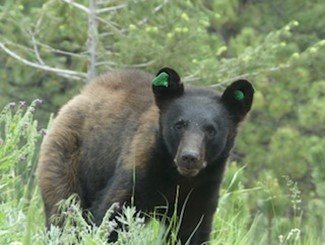Black Bears in Boulder County
By Carron Meaney
American black bears are Colorado’s largest carnivores. Black bears weigh 180 to 275 pounds, though a bruin (male) may be up to 400 pounds. They can be black, cinnamon, blonde, or brown.
Colorado used to have grizzly bears (aka brown bears) as the largest carnivore. However, they were extirpated from Colorado in 1979 after a female attacked a group and was killed by their hunting guide. I curated her remains when I was the Curator of Mammals at the Denver Museum of Nature and Science (Learn more about this specimen in the DMNS). Colorado voted to outlaw spring bear hunting and banned the use of bait and dogs in 1992.
Black bears are omnivores and eat mostly vegetation such as serviceberry, native plum, chokecherry, emerging grasses, and succulent forbs, but also eat beetle larvae, ants, wasps, bees, termites, rodents, rabbits, and the occasional fawn. Carrion is an important food source in early spring.
They have four annual phases:
hibernation in a den (females den earlier than males) lasting 200 days from October-December to March;
followed by walking hibernation, lasting 2 to 3 weeks, during which time they don’t eat or drink;
normal activity, through the summer into fall; and
hyperphagia, when they gorge in order to hibernate successfully.
Black bears have a “light” hibernation meaning that their body temperature does not drop drastically, and they can awaken readily for short periods. Rock shelters and excavations under shrubs and trees are typical dens for hibernation.
They breed from early June to mid-August, with females staying in estrus until bred. Ovulation is induced by copulation. Gestation lasts 7 months with implantation of the fertilized egg delayed until November or December. Cubs are born in the den in late January or February. Cubs stay with their mother during the first year, including denning with her. The young disperse (males disperse farther) when one and a half years old in the next spring or summer. Black bears live about 8 to 10 years, if they survive their first year.
Bears and Human-Provided Food Don’t Mix
Bears are intelligent. In Boulder County, we are aware of the need for bear-resistant trash cans but this isn’t enough. They open car doors, sliding glass doors, or door handles that aren’t knobs. Don’t leave your car unlocked or with any evidence of food in it, even an empty candy wrapper! Bear mortality is greatest when bears are in the vicinity of humans, due to traffic hits or being close to people or houses.
A young female black bear was apprehended in South Boulder last year after she showed aggressive behavior towards people.
She was tagged and relocated to the Estes Park area. She then headed back south. Susan Schiff photographed her 2 weeks later in Pine Brook Hills (shown here). From PBH, she went to the Hill area, where she exhibited aggressive behavior. She charged the two Colorado Parks and Wildlife agents who went to investigate and they shot her. Her sad story is the result of finding human food and then continuing to seek out that resource.
Between 1998 and 2011, Colorado Parks and Wildlife documented 23 attacks by black bears on humans in Colorado (i.e., 1.8 attacks per year). Bears are tagged and relocated after attacks. However, they tend to return to their home location in about 3 weeks. Out of 10 bears relocated from Boulder in the past 3 years, 6 returned to the original site and 2 were hit by cars.
Bears love bird feeders and the “free” high-calorie food they provide. Don’t let bears have this opportunity!
Photo by Jim Adams.
Tips for living safely in black bear country
Lock cars unless in a garage
Never leave any suggestion of food in a car
Lock sliding glass doors
Only put trash out on the morning of pickup, not overnight
Don’t feed wildlife
Bring in your bird feeders (seed, suet, sugar water) every night, or only put them out from Thanksgiving to March


